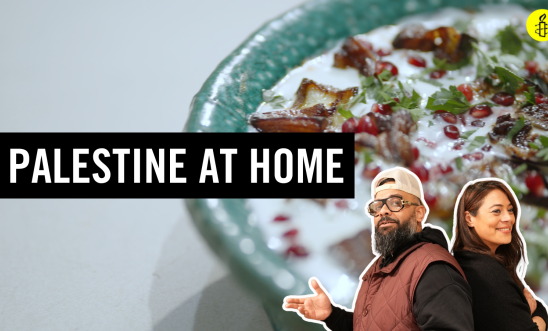
Press releases
UK/Palestine: new 'politically-aware' cookery series launched with Joudie Kalla and Guz Khan

‘Palestine on a plate’ chef Joudie Kalla introduces comedian Guz Khan to traditional ‘fattet makdous’ dish
The ‘Palestine at Home’ series is part of Amnesty’s ‘End Israeli Apartheid’ campaign
‘Showcasing my Palestinian food and heritage is a way of showing resistance to the apartheid system’ - Joudie Kalla
Amnesty International UK has launched an innovative new “politically-aware” Palestinian cookery series, with support from Palestine on a plate chef and author Joudie Kalla, and Guz Khan, star of hit TV comedy show Man Like Mobeen.
Called “Palestine at Home”, the series of recipes and short cookery videos is designed to showcase Palestinian food and the security of home as a means to provide a new angle on - even a form of resistance to - Israel’s international crime of apartheid against Palestinians.
The series, part of Amnesty’s wider “End Israeli Apartheid” campaign, is set to feature a range of Palestinian cuisine and cooks, each with a unique chef-and-guest pairing discussing a specific dish as well as the significance of the food in the context of the human rights situation in the Israeli-Occupied Palestinian Territories.
The first downloadable recipe (see below) and cookery video in the series is for “fattet makdous”, with the Palestinian chef Joudie Kalla introducing the aubergine dish to comic Guz Khan. Each of the featured videos will be accompanied by a downloadable recipe.
Joudie Kalla said:
“Year by year for the last 75 years of illegal occupation, the Israeli authorities are erasing Palestinian culture and history. Showcasing my Palestinian food and heritage is a way of showing resistance to the apartheid system Palestinians are being forced to live under. So, we can share and enjoy the beauty of Palestine, even under apartheid, as those parts seem to get lost in the chaos.”
Guz Khan said:
“The ability to enjoy the food of your own culture with your family and friends in your own home is a basic right, and for Palestinians it’s under serious threat.”
Tom Guha, Amnesty International UK's Crisis Campaigner, said:
“This is politically-aware cookery. This series is about challenging the erasure of Palestinian culture and history - and highlighting how everyday activities like sharing a meal with family and friends are a challenge under Israel’s system of apartheid. Food and home are synonymous with safety - something in desperately short supply for Palestinians right now. We hope people will follow this innovative series as we add to it throughout the year, picking up some cookery tips while learning how they can support our campaign to end Israeli apartheid.”
Apartheid crimes
Last year, Amnesty published a major report showing how the Israeli authorities’ treatment of the Palestinians amounts to the international crime of apartheid, with massive seizures of Palestinian land and property, unlawful killings, the forcible transfer of Palestinian people from their land, drastic movement restrictions, and the denial of nationality and citizenship to Palestinians in Israel. Since the formation of a new Israeli government under Benjamin Netanyahu in December, there has been a sharp deterioration in an already poor human rights situation in Israel and in the Occupied Palestinian Territories.
Amnesty is calling on the UK government to ban imports of all goods produced in Israel’s illegal settlements, while ensuring that UK-based companies are prevented from supplying the Israeli authorities with any equipment which could be used to implement its system of apartheid against Palestinians.
Recipe for fattet makdous (serves 6-8)
Ingredients:
Two thick pitta breads, cut into 2cm diamond shapes
Sunflower oil
Three aubergines, cut into thick 3cm chunks
One tsp salt
A small bunch of fresh flat-leaf parsley, chopped, to garnish
One pomegranate, to garnish
For the yoghurt mix:
800g thick Greek yoghurt
Two garlic cloves, minced
One green chilli, minced
One tsp salt
For the tomato tamarind sauce:
Two onions, cut into half-moon slices
Two x 500g cartons of tomato passata
Four to five tbsp tamarind liquid
One tsp salt
Method:
Begin by heating the pitta bread. Preheat the oven to 190°C fan (210°C/425°F/gas 6-7). Place the pieces of pitta on a tray, drizzle sunflower oil over the top and cook for about 10-12 minutes until golden and crunchy. While they’re cooking, make the yoghurt mix. Place the yoghurt, garlic and chilli in a bowl, add the salt and place in the fridge. Next, make the tomato tamarind sauce. Sauté the onions in a little sunflower oil for about 15 minutes until golden, then add the passata, tamarind and salt and let it stew for about 30 minutes. Next, place enough sunflower oil in a heavy pot to fry the aubergines. They should be cooked until they are golden or a little more. Once they are all cooked, add salt and set aside. Layering: place the pitta bread at the bottom of a deep dish and add the tomato mixture with the aubergines, followed by the yoghurt mixture over the top. Then add the remainder of the fried aubergines, and scatter with fresh parsley and pomegranate seeds, and serve.